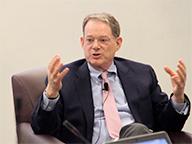Faculty News
—
Prof. Viral Acharya on fire-sale risk in financial markets
—

Excerpt from Bloomberg -- “'The Fed is right to worry about fire-sale risk,' Viral Acharya, a finance professor who focuses on liquidity risk and regulation at New York University’s Stern School of Business, said in a telephone interview on Feb. 25. Lehman and Bear Stearns showed the consequences when 'creditors in the repo market started worrying about these counterparties.'”
Faculty News
—

Excerpt from Bloomberg -- “'The Fed is right to worry about fire-sale risk,' Viral Acharya, a finance professor who focuses on liquidity risk and regulation at New York University’s Stern School of Business, said in a telephone interview on Feb. 25. Lehman and Bear Stearns showed the consequences when 'creditors in the repo market started worrying about these counterparties.'”


















